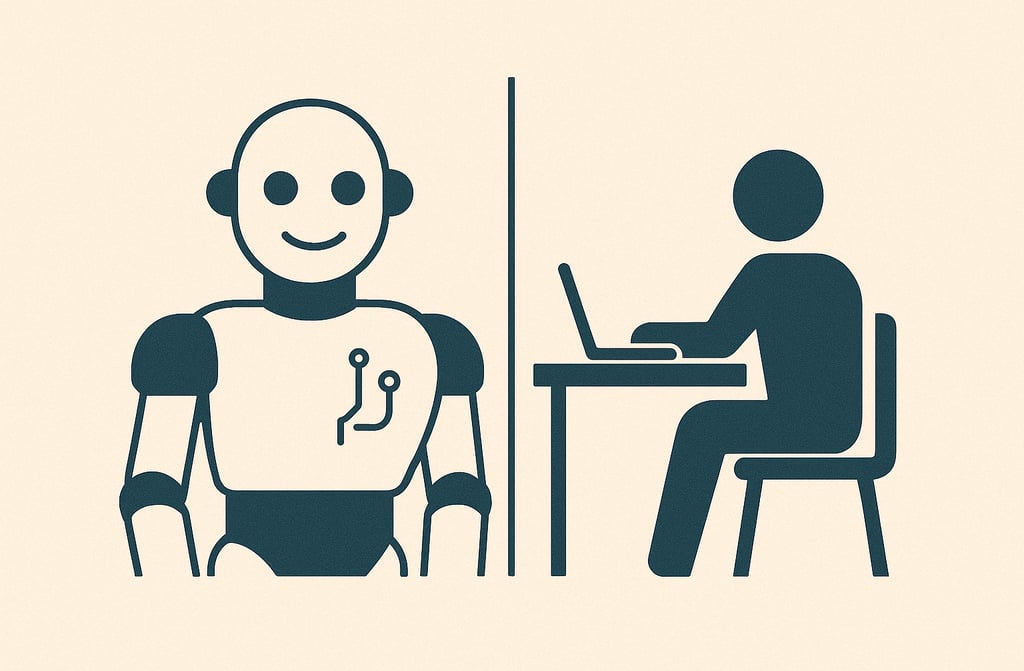AI and Jobs: What Roles Will AI Replace (and Which It Won’t)
From automation to creativity, AI is transforming the way we work — but not all jobs are equally affected. Here's what you need to know.


🤖 Introduction
AI is no longer just a buzzword — it’s becoming part of everyday work life. From answering emails to analyzing data, AI is streamlining tasks like never before. But this raises an important question: will AI replace your job?
The truth is, some roles will change dramatically. Others will remain safe — or even become more important. Let’s break it down.
🔄 Roles AI Is Likely to Replace
These are jobs where tasks are repetitive, predictable, and data-heavy:
Data Entry Clerks
AI can quickly and accurately input, sort, and validate data — often with fewer errors.Customer Support (Tier 1)
Chatbots and virtual assistants can handle FAQs, order tracking, and basic troubleshooting 24/7.Telemarketers
AI can now make scripted calls, follow up with leads, and even mimic conversation patterns.Cashiers
Self-checkout systems and AI payment solutions are reducing the need for traditional cashier roles.Basic Manufacturing Tasks
Robotic process automation is replacing some assembly line and packaging jobs.
🧠 Roles AI Will Support, Not Replace
AI is a powerful assistant for these jobs — not a replacement:
Software Developers
AI can help write code, detect bugs, and automate testing — but it still needs human design and logic.Marketing Professionals
AI can generate content ideas, analyze trends, and personalize ads — but creativity and emotional nuance remain human strengths.Doctors and Nurses
AI helps with diagnosis and data review, but bedside manner, intuition, and human trust can’t be replaced.Project Managers
AI can help track progress and automate reports, but team leadership and decision-making remain human-driven.Teachers
AI tutors can assist students, but teachers bring mentorship, adaptability, and empathy.
🚫 Roles AI Is Unlikely to Ever Replace
Jobs that rely on deep emotional intelligence, critical thinking, and human interaction will remain uniquely human:
Therapists & Counselors
AI can’t truly understand emotions or build the trust that therapy requires.Creative Artists
While AI can generate art or music, human creativity, storytelling, and originality still shine brighter.Skilled Trades (Electricians, Plumbers, etc.)
Hands-on, problem-solving roles in unpredictable environments are difficult for AI to replicate.Leadership Roles
Vision, inspiration, and ethical judgment are human strengths that no AI can replace.
🧩 What You Can Do to Stay Ahead
The key is not to fear AI — but to grow alongside it. Here’s how:
Learn AI-friendly tools in your field
Develop soft skills like communication, adaptability, and creativity
Focus on human strengths — empathy, leadership, and innovation
Stay curious and keep learning — especially as your role evolves
💡 Conclusion: Don’t Compete with AI — Collaborate with It
AI isn’t here to take over — it’s here to transform how we work. Jobs that involve repetition may change or disappear, but new opportunities are emerging in every industry.
Instead of seeing AI as a threat, see it as a teammate. The future of work isn’t just AI — it’s human and AI, working together.